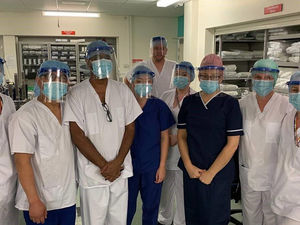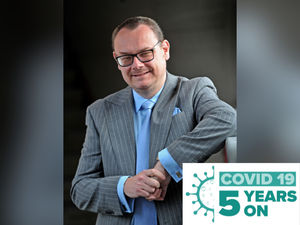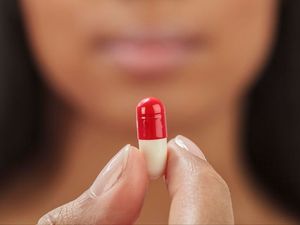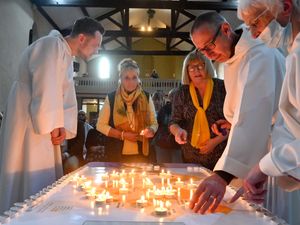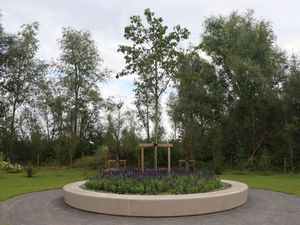Fascinating: Adrian Chiles on helping Novavax vaccine trials
Presenter Adrian Chiles has described the "fascinating" process of helping the latest vaccine become a reality.

Mr Chiles, from Hagley in the West Midlands, was among thousands who took part in testing for the Novavax jab.
The vaccine has been shown to be 89 per cent effective at preventing Covid-19 in the clinical trial run in the UK, which involved more than 15,000 people aged between 18-84, of which 27 per cent were older than 65.
The 53-year-old West Bromwich Albion fan does not yet know if he was given the vaccine or a dummy drug, but says he was delighted to be part of the effort to prove it works.
Novavax should now get approval for use within weeks and 60 million doses are on order, with production to take place in the north east of England.
Chiles, who presents a show on BBC Radio 5 Live, joked: "I was a bit disappointed. I thought there would be a fanfare or a brass band when I arrived for the vaccine. Instead of that I was just ushered in, given the vaccine and a stern talking to and sent on my way.
"It has been a thoroughly fascinating experience. I am now wondering if I had the placebo, and if so do I get a jab? I'm not yet sure."
The presenter earlier described how he had found the whole experience "weirdly fulfilling" and that he felt very much part of the team, willing the dedicated scientists on to make the vaccine a success. He said: "When I read about the 95 per cent success rates of some other vaccines I got a little sniffy about it. I was sure, with me on board, we at Novavax could do better than that."
The man who led the Novavax trial today insisted that vaccines can be adapted with such speed that scientists should be able to "get ahead" of new strains of coronavirus.
Professor Paul Heath said that while some variants were harder to tackle, jabs could be adapted quickly.
Experts have been deeply worried about new mutant strains of coronavirus, including those found in South Africa and Brazil, due to the fact existing vaccines may not be effective against them.
More than 50 per cent of cases in the Novavax trial related to the UK strain of the virus first identified in Kent, with the vaccine offering 86 per cent protection against this strain.
Against the original strain that has circulated since the start of the pandemic, the vaccine was 96 per cent effective.
In a separate South African arm of the trial, where most cases of Covid-19 were the worrying South African strain, the jab was 60 per cent effective in people without HIV.
The UK has secured 60 million doses of the Novavax jab, to be produced on Teesside, with the hope that the Medicines and Healthcare products Regulatory Agency (MHRA) could approve it within weeks.
Prof Heath said there was reason for optimism that vaccines could keep pace with any new variants that are emerging.
He said the results from his trial were "yet another great step forward for the UK", adding: "I think the technology we have both with this vaccine, the Novavax technology, and the other vaccines, it is such that they can adapt quickly so we can expect to see, if required, new vaccines or bivalent vaccines, where two different strains are joined together in the one vaccine.
"And that now can be done at pace so that we can keep up with these variants should they prove to be difficult to prevent with the vaccine that we have at the moment.
"We've seen for the UK that the UK variant can be successfully prevented with this vaccine, which is great.
"Yes, the South African variant is more difficult... But all the technologies we are now seeing mean that we can adapt very quickly to such new variants and produce new vaccines at pace so that we can keep up – and in fact get ahead of – the virus."
In the clinical trial in South Africa, around one third of people tested positive for previous infection with coronavirus.
Novavax said this data "suggest that prior infection with Covid-19 may not completely protect against subsequent infection by the South Africa escape variant" but said its jab provided significant protection.
Professor Paul Hunter, from the University of East Anglia, said that although the trial suggested lower efficacy against the South African variant, 60 per cent protection "is still a worthwhile level of immunity".
He said the vaccine may also offer additional protection against more severe disease.
Former chairwoman of the Vaccine Taskforce, Kate Bingham, said the 89 per cent protection offered by Novavax against the original and UK strains was "phenomenal" but said she hoped the future of vaccines lay in pills, patches and nasal sprays.
Responding to a question about the possibility that regular vaccine rollouts or top-ups could be required, she said: "We need to improve the vaccine formats because frankly two injections delivered by healthcare professionals is not a good way of delivering vaccines.
"We need to get vaccine formats which are much more scalable and distributable, so whether they are pills or patches or nose sprays, we need to find better ways of developing and delivering vaccines, and we'll do that in collaboration just as we've been doing that over the last few months."
Ms Bingham also backed the Oxford/AstraZeneca vaccine after draft recommendation from Germany's vaccination advisory committee on Thursday said there was insufficient data to recommend it for those aged 65 and over.
"The Germans are making a point that they would like more data," she said. "Of course everybody would like more data, but the fact is we've got great data.
"Anybody who I know who is offered an Oxford/AstraZeneca vaccine, I will recommend they take it because it is safe and effective."

